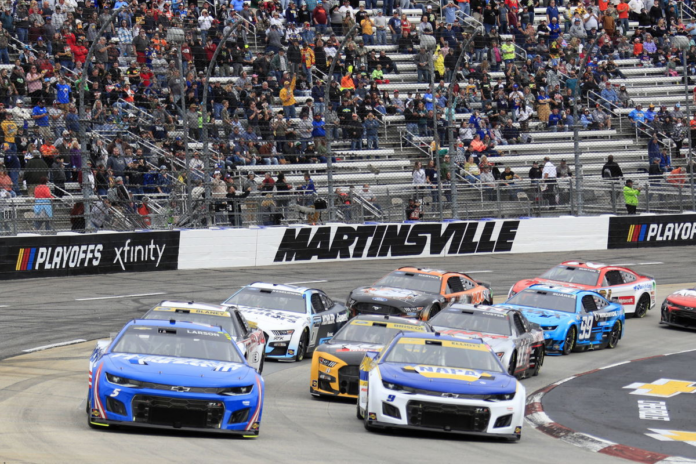It seems like NASCAR is fully embracing artificial intelligence. The playoff format has been subjected to plenty of backlash by fans after Joey Logano won the championship despite having a lackluster season. The Team Penske driver has been dominating the elimination format, especially in the Next-Gen era, with two Cup Series trophies in the last three years. However, the sanctioning body sees room for improvement in its existing structure and is using all the help it can get to make changes.
However, the decision to rely on AI hasn’t gone down well with fans, prompting a prominent NASCAR insider to clarify and defend Chief Operating Officer Steve O’Donnell’s stance. Could the use of emerging technology improve the sport in the foreseeable future? Time will tell.
Are Steve O’Donnell’s comments being misinterpreted?
ADVERTISEMENT Article continues below this ad
The NASCAR fanbase doesn’t take kindly to change. Whether it’s the prospect of switching to Electric Vehicles (EVs) or alterations being made to the current format, the sanctioning body has been forced to adopt a slow approach to not lose its loyal fanbase. Adopting the use of Artificial Intelligence is also being met with far less enthusiasm than anticipated, even though the use of AI could fine-tune the existing format, to ensure races are more entertaining and competitive. At a time when the playoff format has been heavily criticized, modifications being made to the existing structure could only be a good move, right?
Defending NASCAR COO Steve O’Donnell, insider BrakeHard wrote, on X, “Since everyone wants to freak out and not actually read here’s what Steve O’Donnell said. All of it is very reasonable.” The tweet was followed by the Chief Operating Officer’s quote, which read, “When we created even the stages or playoff format (years ago), you did that with the best data you had and best minds you had, but now being able to plug in and work with AI in terms of, ‘OK, if you tweak the playoffs this way, what should we be watching out for?’”
O’Donnell’s quotes may not be controversial, but they are being misunderstood. When the elimination-style format was introduced in 2014, NASCAR used all the data at its disposal to devise the playoff structure, believing it was the best way to take the sport forward. Fast forward to a decade later, and the sport is aiming to use technology once again to make changes. The ‘win and in’ format has been heavily criticized this year, as Kyle Larson’s six wins weren’t enough to earn him a spot in Championship 4.
Many fans believe that using Artificial Intelligence instead of engaging with the NASCAR community is the wrong move. However, the sanctioning body’s pivot to AI is its attempt to remain relevant in a rapidly evolving sports landscape, embracing modernity while keeping the essence of the sport alive. Expressing his hopes for the emerging technology, COO Steve O’Donnell said, “I would say just around racing, the strategy that now goes into a race, how that applies to our formats of the future, I think AI can play a really big role in that.”
NASCAR teams have also embraced Artificial Intelligence
ADVERTISEMENT Article continues below this ad
Trending
NASCAR has always been a sport where the finest of margins can make the biggest differences. Teams have been exploring all avenues to gain a competitive edge, and it seems a prominent team has found a solution. Richard Childress Racing has been using artificial intelligence to have the perfect pit stop after collaborating with Lenovo to get an advantage by gaining real-time insights into refueling.
Fuel mileage can play an important role in NASCAR. Joey Logano won the 2024 playoff race in Las Vegas by outlasting his opponents, and team strategists are constantly tracking the consumption to devise their race plan. With plenty of variables to take into account, including the length and configuration of the track, Lenovo’s AI team is using emerging technology to calculate the amount of fuel being delivered to cars, simply by the time the fuel cans were being connected to the vehicles.
Explaining the technology, Lenovo AI data scientist Sachin Wani said, “An AI engine looks at each frame and classifies whether the fuel can is plugged or unplugged. We’re working at 30 frames per second, so the information is accurate to within about 0.03 seconds. Prior to this, the fuel man knew that he had to pump in about seven seconds worth of fuel—without any devices to help because of safety concerns.”
ADVERTISEMENT Article continues below this ad
With Lenovo’s AI doing a lot of heavy lifting, it has eliminated a significant amount of guesswork that has been prevalent in the pits. Even an extra second of refueling can change the weight of the car, which means the performance of the vehicle is affected. Complimenting the technology, RCR’s technical director, Eric Kominek said, “The AI provides the teams with more confidence in the numbers.” It seems artificial intelligence is here to stay in NASCAR, and fans need to accept, if not embrace the technology, as it could play a pivotal role in years to come.


